- Home
- Peter S. Beagle
The Folk Of The Air Page 7
The Folk Of The Air Read online
Page 7
“Nobody I know does,” he said. He thumped the helm, which responded softly in the tense, eager way that his lute did when he spoke to it. Julie said, “That’s not part of the suit. I made that one a long time ago. I just threw it in for effect.” She smiled as Farrell blinked from her to the helm and back. “I made the chain mail, too,” she said. “Guess what I used.”
“Feels like coathangers. What I want to know is why. I know you can do anything, but it seems like a limited field.” He fingered the silver-enameled links again; then peered at them more closely. “My God, these things are all welded shut. Did you do that?”
Julie nodded. “They aren’t coathangers, though.” She stood up, deftly taking the blankets with her. “Did anyone ever tell you that there’s no bottom to your navel? It just goes on forever, like a black hole or something. Come on and get dressed, I have to go to work.”
In the shower he guessed that she had cut springs apart to make the rings; over oranges and English muffins, she talked freely about interweaving them in a four-to-one pattern and about being taught to weld by a friend whose house she had decorated. But she would not say why she had made the armor, or for whom. “It’s a long story, I’ll tell you when we’ve got more time.” Farrell could tease nothing further out of her. He let it go, saying deliberately, “Doesn’t look nearly as much fun as throwing pots,” so that she could escape into her favorite subject of ceramics. He knew just enough about it to ask fairly intelligent questions; but he liked to watch her talk about her skills.
After breakfast he drove her up to the university, where she did medical and scientific illustrating. “Cross-sections of vertebrae, detail studies of adrenal glands. I like it. I’m good at it.” She had held the job for more than a year.
“You don’t paint anymore,” he said. “I’ll have to take my easel back.” He had made the easel for her five years ago, in Oberlin, the semester that she went back to school. Julie smiled slightly at her hands.
“I never painted,” she said. “I can’t paint. I can draw, so I do that.”
Farrell said, “Jewel, you can do anything. It’s made a difference in my life, knowing you can do anything.”
“No, I can’t!” she cried harshly. “Sorry to disappoint you, but I don’t fool myself so much these days. Stop imagining me, God damn it, it’s time for that too.” Farrell heard her throat close down and her teeth click. She said nothing after that until he stopped the bus on campus, as close to her office as he could go. He opened the door for her and helped her down in a way that began as a chivalrous joke and ended with them standing in a soggy heap of paper plates and torn political posters with their hands on each other’s arms.
“What happens now?” he asked. “What are we now?”
Julie prodded his stomach thoughtfully. “Goodness,” she said. “When I think I might have gone my whole life without ever knowing about that navel.” She pulled his shirt down, tucking it in carefully. “I go out for lunch around noon,” she said.
“I’ll be job hunting. Meet you for dinner.”
“There’a a Moroccan restaurant up near the Waverly. We can have couscous. I introduced you to couscous, didn’t I?”
“In the Rue du Four. Do you know, we’ve never eaten in the same place twice?”
“No,” she said. “Are you serious?” He nodded, thinking she would laugh, but she looked startled and sad. He said, “It’s all right. One thing Avicenna’s got, it’s got restaurants.”
“Don’t,” Julie said. Pain in her voice was as new a sound to Farrell, as if she had begun to crow or whinny—he hardly recognized it. “Poor topcoat,” she said. She took his hands between her own and brought them to her lips, looking at him over them with mocking, marveling eyes.
“Just don’t imagine me, that’s all,” she said. “Seven o’clock at Fouad’s.” She bit his fingers gently and left him there, watching her calm legs carry her away down a gravel walk and through a door. A momentary intuition that he would never see her again pinched his breath, as it had done the day before. You can only watch someone go away so many times. That was why—in spite of himself, in spite of what he had told Ben in the gym—he still mourned, grudgingly and foolishly, for so many doomed creatures and landscapes and ways of being that he had never seen. To feel the loss, to know what was lost. To remember. That might be what I do best, after all. I hope not. He got back into the bus and drove up to Barton Park in the hills, to see about the zoo.
Chapter 6
There was one job open, driving an electric train in the shape of an alligator around and around the zoo six afternoons a week, lecturing to his passengers about the animals they were glimpsing. Farrell had hoped for something to do with gorillas; but it was outdoor work, at least, and decently mindless. He agreed to start on the following Monday and left with a copy of the route and the recitation to memorize. There were five and a half jokes in it, underlined in red.
When he went home to change his clothes, he found the driveway occupied by a middle-aged yellow Pontiac, with the left front fender mashed into a rusty fist. He parked Madame Schumann-Heink a block further on and walked back to the house. There were skid marks behind the Pontiac where it had spun up the driveway, clipping off two of Ben’s birdhouses and grinding a patch of wild rosemary to rags. The driver was still sitting behind the wheel, randomly pushing the tape deck buttons, but he looked up and opened the door as Farrell approached. “Hi there,” he said in a cheerful, rather boyish voice. “Hey, you seen my wife yet?”
He was younger than Farrell, with a round, firm, deeply tanned face under a surfer’s helmet of crusty white-blond hair. His sideburns were a shade darker, thick and stubbly; his mustache colorless, almost invisible. Farrell saw that his lower lip had been bleeding.
“I don’t think so,” Farrell said.
The young man got out of the car as he started past it. He was stockily built, Farrell’s height but at least twenty pounds heavier. He said, “But you’re going to see her.”
Farrell stared. The man came closer, smiling. “I mean, if you go in there, into that house, you’ll see her. I mean, that’s where she works, isn’t it?”
“Oh, Suzy,” Farrell said without thinking, and immediately wished he hadn’t. The young man’s friendly expression did not change, but rather became fixed on his face, as if he had died. “Suzy McManus, right, you got it, good old Suzy. Well, I’m Dave McManus. Dave McManus. I’m good old Dave.” He caught Farrell’s hand and shook it long and gently, looking straight into the eyes all the while. His own hand was cold and wet and hard.
Farrell had seen pure white drunkenness before, but not often enough to recognize it at sight. He knew the thing itself, however—the freight train rattling and lurching comically from hilarity to slobbering sorrow, picking up speed as it passed through wild, aimless anger straight on into wild sickness; and then, running smoothly and almost silently now, into a dark place of shaking and sweating and crying, and out again with no warning to where a dazzling snowy light made everything very still. McManus neither swayed nor mumbled and hardly smelled of alcohol at all, but Farrell began to back away from him. McManus’s smile widened with each step.
“I won’t hurt you,” he said. “I just want to see my wife, the same as you do.” He patted his windbreaker pocket, and Farrell saw how heavily the fabric shifted and swung. “You take me on in there. In the house.”
Farrell took another step backward, trying to angle himself toward a parked car. McManus patted his pocket again and shook his head earnestly. “Come on, there’s a dog. I don’t want to hurt the dog.”
“She’s a trained killer,” Farrell warned him. “They had her in the Army, she used to give courses.” He was trying desperately to assess the chance of Suzy’s being in the house that morning. McManus put his hand in his pocket and whistled two notes. Farrell walked slowly past him and up the porch steps.
Briseis met him at the door, whining nervously at the sight of the stranger crowding in behind him. For a momen
t Farrell entertained a mad vision of scooping the Alsatian up in his arms and hurling, or at least shoving her at McManus. But the man was too close, and Farrell knew himself just as likely to rupture something important or throw his back out. McManus stooped to scratch Briseis’s ears, and Farrell tensed, thinking, This is not happening. Then Suzy came out of a tiny sewing room into the hallway.
When she saw McManus, she caught her breath, started to speak, and then shut her mouth and very carefully set down the sponge mop and bucket she was carrying, leaning the mop against the wall. “Dave,” she said, and stood waiting.
McManus’s ragged lower lip started to bleed again. Tears sprang out of his eyes in a sudden dreadful spurt, more like shotgun pellets than drops of water. “Bitch, fucking bitch!” he shouted at her, his light voice splintering into shrill fragments. “Bitch, I love you!” Suzy turned and ran for the living room, and McManus shoved Farrell aside and leaped after her, tugging at his pocket. He promptly tripped over Briseis and fell flat, landing with the gun under him. Briseis, who expected the end of the world at any given moment, screamed in confirmation of her worst forebodings. She threw herself on Farrell for comfort, buffeting him so frantically that he almost fell himself. McManus scrambled to his feet and lunged toward the living room. He had torn his pocket getting the pistol out.
“Do you come here often?” Farrell asked Briseis. There was a crash in the living room, and McManus yelled, “Well, shit, don’t blame me for that!” Farrell went into the room in a crouching waddle, taking cover behind chairs. Suzy was halfway up the stair; but, as he watched, she paused, turned, and started slowly back down toward McManus, who was standing over the shards of a stoneware lamp. “No,” she said, astonishingly loudly. “No, why should I run from you?”
McManus, who had been steadying the gun with both hands, now let it fall to his side. For the first time, he suddenly looked drunk. He chewed his bleeding lip and sniffed, muttering, “Okay, okay, come on.” But Suzy shook her head, and to Farrell’s amazement she smiled.
“No,” she said again. “Go home, Dave. I’m not coming with you, and I’m not running away from you anymore. I just now realized I don’t have to. She showed me.”
“Bitch,” McManus whispered. “Bitch, bitch.” Farrell could hardly hear him; and indeed, the words seemed not to be addressed to Suzy at all, but to someone remembered or imagined. “She showed you. Blow her flicking head off, she showed you.” He raised his head and smiled suddenly, coldly in touch with his drunkenness again. “I love you, Suzy,” he said. “You know I love you. Look, I threw Mike out, I mean for good, like you wanted. I just said, ‘out, man, Suzy’s coming home.” Something in the little shrug and cavalier flip of his free hand—like a Chaplin back-kick—made Farrell see for a moment what Suzy might have loved.
“But I’m not coming home,” Suzy said gently. She came all the way down to the last step, which put her on a level with McManus, and she met his eyes with a frail, compassionate dignity. She said, “Take care of yourself, Dave. I’ll be all right.” Abruptly she ducked her head, kissed McManus on the cheek, and started past him toward the kitchen. “Cleaning,” she said, “Floors.”
Later Farrell thought that she might have gotten away with it, except for the kiss. McManus blinked after her and seemed to slump into himself, rubbing his jaw and mumbling, actually beginning to turn away. Then his hand brushed the place where Suzy had kissed him, and without a word, he turned and swung the gun up at arm’s length, pointing it at her back.
Farrell shouted, and Suzy looked back and cried out, “Mother, help me!” The shot sounded like a baseball bat slamming down on the living room floor. Farrell went over the coffee table, but McManus was down before he reached him, clutching his leg and wailing in a kind of terrible gargle. The room smelled of badly burned toast. Suzy started toward her husband, almost stepping on the pistol as she did so, and then halted, as frozen as a deer in headlights, looking past Farrell. Sia was on the stair.
She was wearing a long, flowered dress that hung on her like a tablecloth, and she carried a red plastic comb in her right hand. The air tightened on Farrell as he stared at her, trapping him as if in thrashed, sweated bedsheets. Her face was without expression, her voice small and colorless when she said to McManus, “Stand up. Stand up on your feet.” Her own feet were bare, wide, and quite clearly as flat as bread boards.
“He can’t.” Suzy protested. “He’s hurt himself, he needs a doctor.” She knelt beside the gasping, whimpering McManus, trying to keep his hands from the wound. The small distant voice said, “Stand up,” and Farrell felt the two words grind together like millstones. McManus stopped crying.
“Stand up,” Sia said once more, and McManus climbed upright and stayed there somehow, his open, straining mouth making him look as if he were waiting to belch. The bullet had apparently gone through the calf of his leg; there was comparatively little blood. He moved his lips weakly, saying, “The gun.”
“Go away,” the voice said. “Never come near this house again. Never come near her again. She is under my protection, and if you trouble her, you will die. She is one of mine. Go now.”
Again Suzy declared, “Oh, he can’t, don’t you see he can’t walk? We have to call a doctor.” But Sia gave no sign of having heard; she moved her disheveled head slightly, and McManus, as if on wires, made a single lurching hop toward the door. His face was as white and wet as cottage cheese, and the reek of his pain burned in Farrell’s nostrils.
A plump figure appeared in the living room doorway, trailed by a tiptoeing Briseis. Farrell recognized the man as one of Sia’s more wistful clients. He said, “The front door was open, so I just,” peering at the scene with a ruminant’s unfocused near-interest. Nothing in his round, freckled face, puckered thinly like an aging balloon, suggested even momentarily that he smelled gunpowder or saw the smashed lamp or any blood.
Farrell, Suzy, and McManus gaped silently at him, but Sia nodded calmly, saying in her normal voice, “Hello, Robert, just go on along.” She stepped aside to let him by, and he went up the stairs without looking back. No one spoke or moved until the door of Sia’s office rattled overhead.
Suzy went to support McManus, but he pushed her away violently, summoning all his numbed vitality to make himself step toward Sia. Over his shoulder he said to Suzy, “You better go on up there, baby, the man’s waiting.” Farrell fully expected to see him lunge barehanded up the stairs at Sia; his voice was slow with pain, and with the loneliness of great hatred, and he looked at Sia fearlessly. “One of yours,” he said. “Yeah, I bet she’s picked up a few new tricks since you’ve had her. Hey, I’d pay to learn them, I can pay.”
The good leg buckled under him—though Farrell saw nothing that could have made him slip—and he crashed to his knees before Sia at the foot of the stair. Sia neither moved nor spoke. Farrell smelled wet earth, wet crushed grass, something like coffee, something like the fur of a dead animal. He heard a whimpering, took it first for Briseis, and then understood that the sound was happening in his own throat. He could not make it stop.
This was nothing like the reflected image he had seen of the huge woman with the dog’s head. Sia herself was hardly there at all; she seemed to thin and dwindle almost to transparency, even in Farrell’s mind. But for one truly unbearable moment—one instant in which names for things had not yet been invented—he was more aware of her presence than he ever had been of his own. He felt her breathing in the stairs and in the old floor under his feet; she surrounded him with her walls and her rooms, moving in the stones of the fireplace, looking at him from the pieces of the broken lamp, speaking in the sunlight’s darting scrawl across the living room rug. Beyond the house, there was only more of her, no least refuge inside himself, for she was that place, too, laughing in his bones, teasing his atoms to make them rattle in the dark like dice. However he turned, he fell toward her, terribly content.
Beside him, McManus crouched lower and lower, his limbs spraddling as if a great foot were
crushing him to earth. As Farrell watched, the weight seemed to release him, and he rose slowly and half hopped, half hobbled toward the front door, drawing in his breath with every step. Suzy started to follow, but the woman on the stair looked at her, and she put her hands to her mouth and went into the kitchen. Farrell heard McManus stumbling and cursing wearily under a window, and then the sound of the Pontiac’s engine.
“I couldn’t see what happened,” he said. “With the gun.” Sia smiled at him in mild puzzlement. Farrell said, “She called you mother.”
Sia plucked at the front of her dress, the nervous habit of a heavy woman. “I must go up to poor Robert,” she said. “He will spend half our time now apologizing for coming in without knocking. Such a strange arrogance they have, the timid ones; how they peep at themselves.” She sniffed and rubbed her nose, having had a cold for two days.
Farrell watched her hoisting herself up the steps one at a time, pausing on the landing to sigh angrily, as she always did. Briseis came to shove her muzzle into his hand, and Farrell petted her, saying absently, “It’s all right, don’t be scared.” But Briseis smelled the gunshot and the blood, and she simply lay down flat, too overcome by human confusions even to whine. Farrell said, “Don’t think about it, that’s all. Just be a dog, that’s what I’m doing.” He took her outside to sit on the front steps, where she found her favorite ragged beach towel and killed it several times, while he played some of Henry VIII’s songs for her.
Chapter 7
Julie and Farrell’s record for mutual toleration was slightly less than five consecutive days, set almost eight years before on Nantucket. They celebrated their sixth day together by going again to the Moroccan restaurant, where they had couscous and warm, bitter champagne. Farrell spent the first half of the dinner in playing happily with Julie’s fingers and grinning at her; and the second half in telling her, headlong and in no order at all, everything he could put into words about Sia and Ben and Suzy’s visitor. Julie listened silently, attentive but expressionless, until he ran out of champagne, fingers, and phrases to describe Sia barefoot on the stair in her flowery dress.

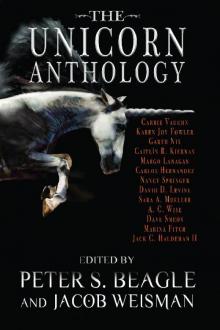 The Unicorn Anthology.indb
The Unicorn Anthology.indb Sleight of Hand
Sleight of Hand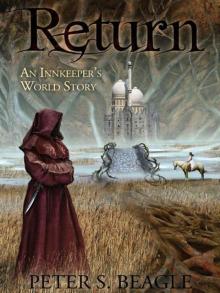 Return
Return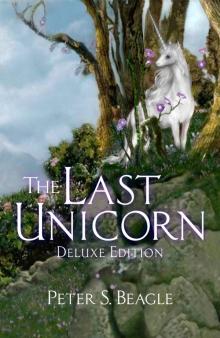 The Last Unicorn
The Last Unicorn Two Hearts
Two Hearts Mirror Kingdoms: The Best of Peter S. Beagle
Mirror Kingdoms: The Best of Peter S. Beagle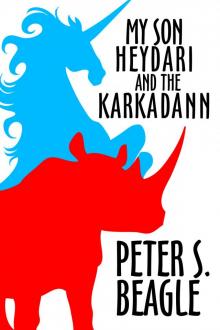 My Son Heydari and the Karkadann
My Son Heydari and the Karkadann The Magician of Karakosk, and Other Stories
The Magician of Karakosk, and Other Stories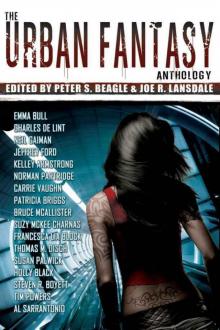 The Urban Fantasy Anthology
The Urban Fantasy Anthology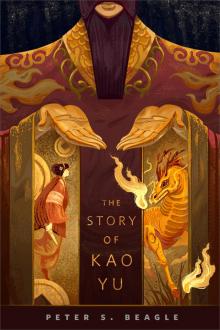 The Story of Kao Yu
The Story of Kao Yu The Karkadann Triangle
The Karkadann Triangle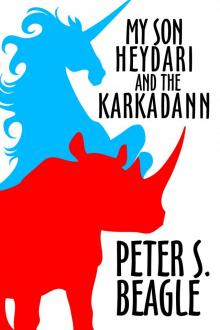 My Son and the Karkadann
My Son and the Karkadann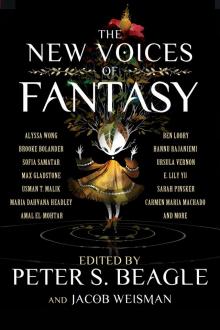 The New Voices of Fantasy
The New Voices of Fantasy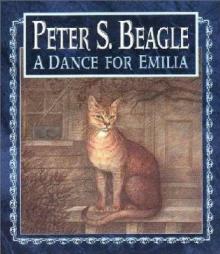 A Dance for Emilia
A Dance for Emilia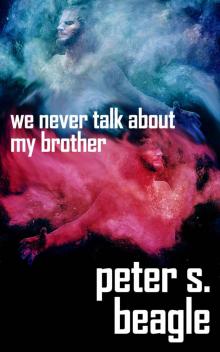 We Never Talk About My Brother
We Never Talk About My Brother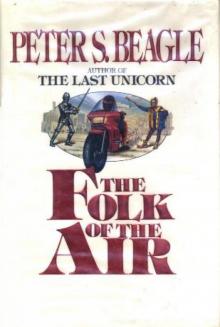 The Folk Of The Air
The Folk Of The Air The Magician of Karakosk: Tales from the Innkeeper's World
The Magician of Karakosk: Tales from the Innkeeper's World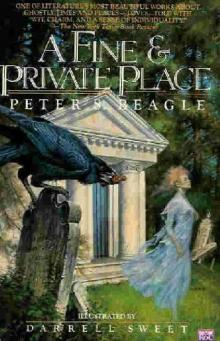 A Fine and Private Place
A Fine and Private Place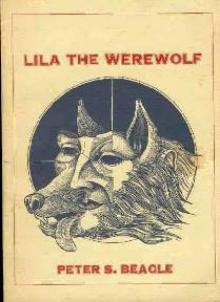 Lila The Werewolf
Lila The Werewolf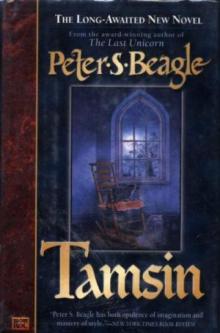 Tamsin
Tamsin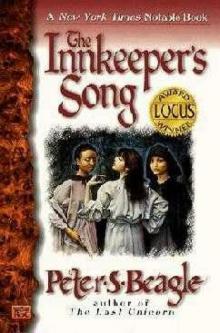 Innkeeper's Song
Innkeeper's Song